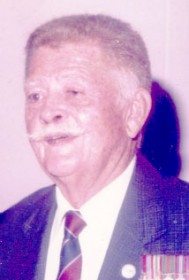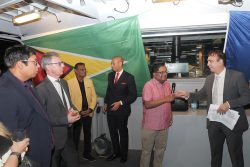Ewart Neil Malcolm Isaacs, AA, CPM, former Deputy Commissioner of the Guyana Police Force and a military veteran of the Second World War, died on September 13, aged 87.
Neil Isaacs could easily have been mistaken for a British army cavalry officer. Mounted on a black charger, dressed in navy blue ceremonial suit with mail epaulettes, leather riding boots and sword drawn, he rode erect through Georgetown as a Senior Superintendent of Police in command of the mounted escort to the Duke of Edinburgh’s motorcade during his visit to Georgetown on February 7, 1962.

Nine days later, Isaacs was dismounted, dressed in khaki with his feet firmly on the ground. Tear smoke canisters exploded in the streets and smoke billowed in the central business district as the police tried to control the crowd in the February 16 riots in Georgetown. Isaac’s close friend and colleague Superintendent Deryck McLeod was shot dead in Robb Street and other policemen were injured.
News of the shootings generated alarm in the barracks and a group of dissident policemen confronted the local-born Commissioner Ronald Weber. Given the frightening security situation on the streets of Georgetown at that hour, the policemen’s conduct was seen as threatening, or worse. Troops of the 1st Royal Hampshire Regiment landed and quelled the disorder in the city. But disciplinary action against the policemen followed. Ronald Weber was replaced by Peter Owen, a Britisher, later that same year.
Neil Isaacs’s seniority in the hierarchy of the British Guiana Police Force placed him at the centre of law enforcement in those troubled pre-Independence days of strikes, riots and murders. He gave evidence to the Commissions of Inquiry into the February 1962 Disturbances in Georgetown and the May 1964 Disturbances at Wismar, Christianburg and Mackenzie. When, in 1964, the British Guiana Special Service Unit was established as a paramilitary force to deal with the disturbances, it fell under the direct authority of the Governor and was administered by the Police Force. Isaacs it was who exercised de facto day-to-day control from his Eve Leary office.
Isaacs relished policing. One of the most exciting operations in which he participated was the manhunt for the desperado Clement Cuffy in September 1959 on the West Coast. Cuffy, a wanted man, had shot his way out of a cordon led by Assistant Commissioner David Rose and killed a policeman. Neil Isaacs and Deryck McLeod led a special detachment which rushed to the area to support the operation and Cuffy was finally killed in a ‘shootout’ with the police. He served in the Rupununi District where he developed his love of horsemanship and was to play a key role in organizing police gymkhanas at Eve Leary at which the dexterity of the Mounted Branch was always the main attraction.
Neil Isaacs’s entry and progress in the British Guiana Police Force was the consequence of a fortunate coincidence. The Legislative Council, at the urging of John Carter – the Member for Georgetown South – and with the support of Vincent Roth and Cheddi Jagan, passed a motion in October 1949 which paved the way for what came to be known as the ‘Guianisation’ of the public services and the Police Force. This had the effect, albeit gradually, of admitting local persons as ‘gazetted’ officers instead of importing expatriates to fill senior positions. The following year, the Inspector General of Colonial Police Forces visited the colony and inaugurated the system of training courses for Guianese officers in Britain.
Neil Isaacs had been demobilised from military service in the British army in 1948 and became a beneficiary of these two innovations – Guianisation and British training. Isaacs, with the British-born officer Ian Puttock, attended the ‘Course for Cadet Officers Newly-appointed’ and was trained on the Basic Police Course at the Police Training School at Mill Meece in Staffordshire. He attended courses later at Hendon Police College in London and Scottish Police College at Tulliallan and, later in his career, at the International Police Academy in the USA.
On his return from basic training, he was appointed Assistant Superintendent of Police on May 17, 1952. He rose at a relatively rapid rate over the next 13 years, from the rank of Assistant Superintendent to Deputy Superintendent in 1954; Superintendent in 1959; Senior Superintendent in 1960 and Assistant Commissioner in 1963. He was appointed Deputy Commissioner at the age of 42 years in 1965.
With the change in administration after the 1964 general elections and the approach of Independence, the tempo of ‘Guianisation’ accelerated. Forbes Burnham, Neil Isaacs’s old classmate from Queen’s College, whom he fondly called by his schooldays’ nickname of ‘Odo,’ had become Premier in 1964. Commissioner Peter Owen was sent on ‘severance’ leave in 1965, within months of the new administration’s entry into office. Ian Puttock – the last Britisher to hold that office – was appointed to act in his place but he resigned in Independence year, 1966.
It might have been expected that Isaacs, by that time the Deputy Commissioner, would be appointed Commissioner. To some surprise, Felix Austin, who had joined the Force as a constable in April 1936, was appointed on January 1, 1967. Equally surprisingly, Austin’s tenure came to an unexpected end on October 20 the same year after the National Assembly passed an amendment requiring the Commissioner of Police to retire at the age of 55 years.
Deputy Commissioner Neil Isaacs and Assistant Commissioner Carl Austin acted as Commissioner of Police on various occasions for the following twelve months. Yet another surprise followed on November 1, 1968 when Austin was appointed Commissioner and Isaacs was allowed to depart on early retirement.
Neil Isaacs had entered police service after a commendable seven-year period of regular military service. He enlisted in the British Guiana Home Guard at the age of 18 in 1941 and, when the War Office took the decision to send West Indian soldiers into theatres of war, he joined the South Caribbean Force. Isaacs was commissioned as a lieutenant in the 1st Caribbean Regiment of the SCF and served briefly in Trinidad and St Lucia before travelling to Italy and then to Egypt.
At the end of the Second World War in 1945, he transferred to the 1st Loyal Regiment of the British Army and continued his service in Egypt, Palestine, Jordan, Lebanon, Eritrea Cyprus and France. It was while in Palestine – during the British mandate for the territory that later became the state of Israel – that he attended military training courses at the Middle East School of Infantry and the School of Firearms. The Loyal Regiment, in the immediate aftermath of the war, however, was contracting, and Isaacs was demobilised in the rank of Captain in 1948. He returned home where he served briefly in the British Guiana Volunteer Force which was formed that very year.
Neil Isaacs had intended initially to become an accountant after he left Queen’s College at the age of 17 years. With that career in mind, he started his working life at Sprostons Ltd, in 1940 before going to Wieting and Richter, a Water Street firm. After the war, he returned to work at Wieting and Richter in 1948 and had a brief spell at the Carib Hotel on the East Coast. It was then that the opportunity arose for him to join the British Guiana Police Force as a cadet officer.
After taking early retirement from the Force, he held various security and managerial appointments at Bookers Sugar Estates Ltd and, after nationalisation, the Guyana Sugar Corporation and Demerara Distillers Ltd. Unfazed by his professional reverses in uniformed service, the turned his talents to community service.
Isaacs was a thoroughly Guyanese man. His world view was reflected in the words he wrote as District Governor on the 25th Anniversary of the Rotary Club of Georgetown: “Service is the cornerstone of Rotary and the motto – Service above Self – implicitly calls upon the individual Rotarian to fulfil his part.” That he did in various ways.
He served as Vice-President and, later, Trustee of the Guyana Legion and was Chairman of the Commission to amalgamate veterans organizations and ex-soldiers’ associations. He was appointed Chief Scout of the Scout Association of Guyana. He served as President of the Rotary Club of Georgetown, 1978-79; District Governor, 1983-1984 and was honoured as a Paul Harris Fellow of Rotary International. He spoke French and particularly enjoyed visits to Francophone countries such as Guadeloupe and Martinique for Rotary conventions. He was also an affiliate of the Royal Commonwealth Society and a member of the International Association of Chiefs of Police.
Neil Isaacs contributed to the work of the Children Dorcas Home, now called Mildred Mansfield Youth Club, and the Guyana Red Cross Society, especially during the period of the construction of the Convalescent Home in D’ Urban backlands. He held a sort of unofficial national record for donating over one hundred pints of blood to the Central Medical Laboratory’s Blood Bank over a period of time. Yet he found time for cultural activities. Fond of acting on stage and screen, he played parts in several plays at the Theatre Guild and the National Cultural Centre and in films such as Wide Sargasso Sea, The Seawall and Mustard Bath. He was also an elder of the Church of Scotland.
Ewart Neil Malcolm Isaacs was born to Sydney and his wife Gladys Isaacs on July 4, 1923 in Georgetown. He was educated at St Stephen’s Scots School and Queen’s College and took his Oxford and Cambridge School Certificate Examinations in 1939 – the same year as his classmates Richard Allsopp and Forbes Burnham.
Isaacs was among the most decorated Guyanese veterans of the Second World War. During his military service, he was awarded the Defence Medal, 1939-1945; the War Medal, 1939-1945; the Italy Star; the 1939-1945 Star and the General Service Medal for Palestine, 1945-1948. For his police and public service, he was awarded the Colonial Police Medal for Meritorious Service, 1964; the Guyana Independence Medal, 1966 and the national award of the Golden Arrow of Achievement in 1984.
Neil Isaacs married Jessie McRuvie, née Mitchell, on June 26, 1959. They had two children, John Alexander and Susan Alexandra who survive him.





